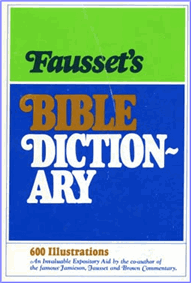Fausset's Bible Dictionary
A B C D E F G H I J K L M N O P Q R S T U V W X Y Z
Testament
"Testament" for each of the two divisions of the Bible comes from the Latin Vulgate version. In Matthew 26:28, "this is My blood of the new testament" would perhaps better be translated "covenant," for a testament does not require blood shedding. Still, here and in the original (Exodus 24:8) quoted by Christ the idea of testamentary disposition enters.
For his blood was the seal of the testament. See below. Moses by "covenant" means one giving the heavenly inheritance (typified by Canaan) after the testator's death, which was represented by the sacrificial blood he sprinkled. Paul by testament means one with conditions, and so far a covenant, the conditions being fulfilled by Christ, not by us. We must indeed believe, but even this God works in His people (Ephesians 2:8). Hebrews 9:17, "a testament is in force after men are dead," just as the Old Testament covenant was in force only in connection with slain sacrificial victims which represent the death of Christ. The fact of the death must be "brought forward" (Hebrews 9:16) to give effect to the will. The word" death," not sacrifice or slaying, shows that "testament" is meant in Hebrews 9:15-20. These requisites of a "testament" here concur:
1. The Testator.
2. The heirs.
3. Goods.
4. The Testator's death.
5. The fact of His death brought forward. In Matthew 26:28 two additional requisites appear.
6. Witnesses, His disciples.
7. The seal, the sacrament of the Lord's supper, the sign of His blood, wherewith the testament is sealed. The heir is ordinarily the successor of him who dies, and who so ceases to have possession. But Christ comes to life again, and is Himself (including all that He had), in the power of tits now endless life, His people's inheritance; in His being heir (Hebrews 1:2; Psalm 2:8) they are heirs.(See COVENANT; HEIR; WILLS.)
Bibliography Information
Fausset, Andrew Robert M.A., D.D., "Definition for 'testament' Fausset's Bible Dictionary".
bible-history.com - Fausset's; 1878.
Copyright Information
© Fausset's Bible Dictionary
Fausset's Bible Dictionary Home
Bible History Online Home
Bible Encyclopedia (ISBE)
Online Bible (KJV)
Naves Topical Bible
Smith's Bible Dictionary
Easton's Bible Dictionary
Schaff's Bible Dictionary
Fausset's Bible Dictionary
Matthew Henry Bible Commentary
Hitchcock's Bible Dictionary

Dr. A.R. Fausset
Popular and Trending:
Meaning and definition of fasting, what is fasting in the bible, fasting definition, why should I fast, the power of prayer and fasting, Location of Galilee, where was galilee in the bible?, fasting definition, Galilee region, cities of Galilee, Sea of Galilee, Definition of biblical fire, what is fire in the bible?, fire and brimstone, fire meaning, baking bread with fire, Definition of the biblical firmament in Genesis, what is the firmament in the bible?, was the firmament the third heaven, firmament meaning, did the firmament bring the flood of Noah?.
